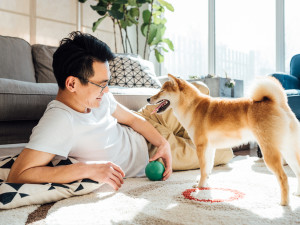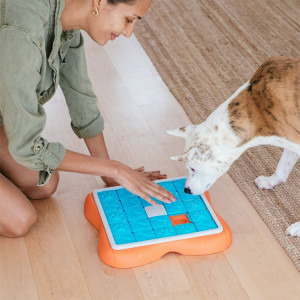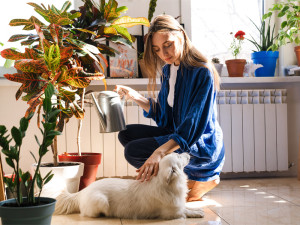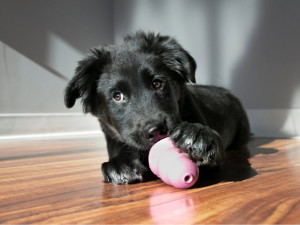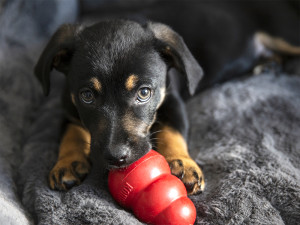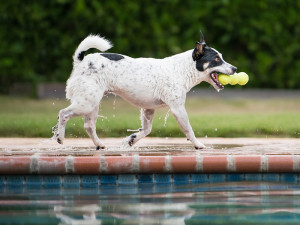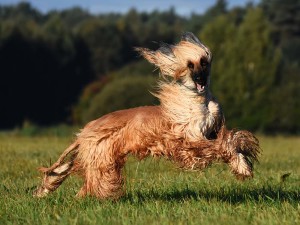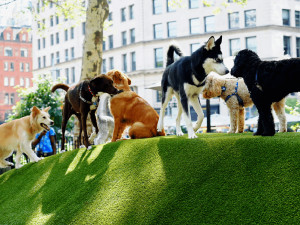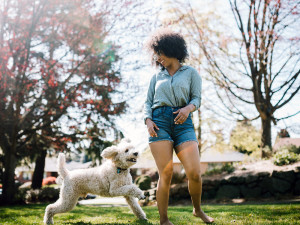The Definitive Guide to Choosing Safe Dog Toys
Tips for pet parents who want their pups to have safe fun.
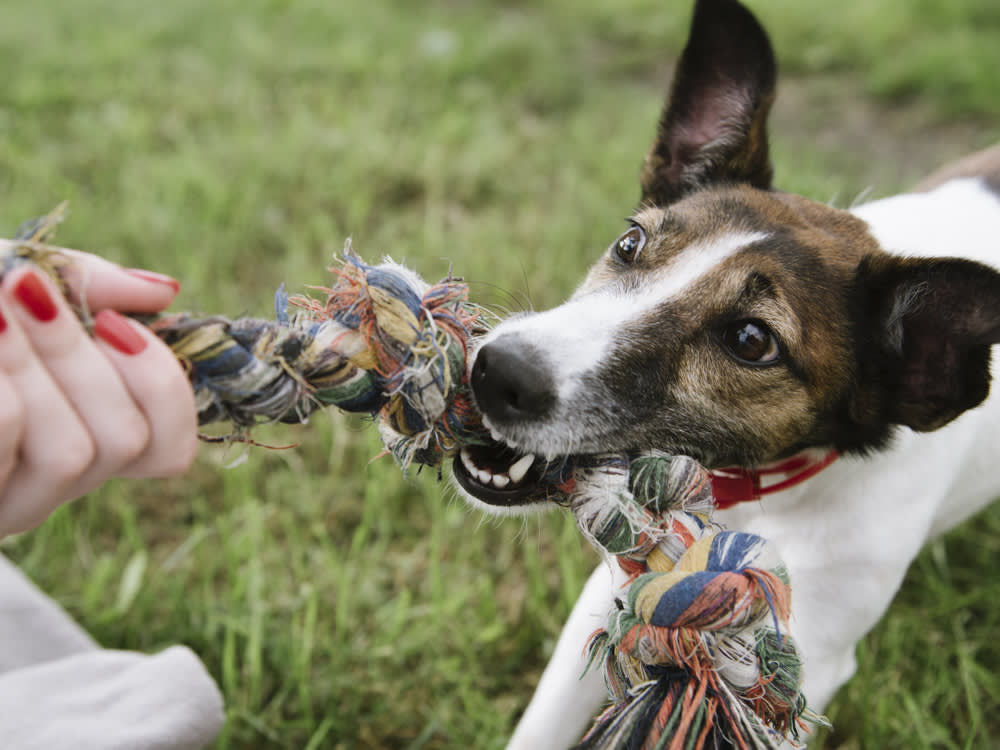
Share Article
As any true pet parent knows, toys for your pup are no mere luxury: They make the world go round (and around and around). They make it bounce, roll and soar. They inspire play, enrich training, ease boredom, and curb problem behaviors in dogs.
Experts say that dogs need them, and need different types: Toys that your pup can sink their teeth into to take the edge off a bad day; softer toys to satisfy your pup’s gentler instincts; frisbees, balls, and tug toys to share the fun.
Which dog toys are safe?
Don’t judge a dog toy by its cover — or by its colorful packaging: “The packaging for these products is incredible and totally deceiving,” says Pattie Boden, owner of the Animal Connection in Charlottesville, Virginia. Boden, who is selective about sourcing safe, natural toys to stock her shelves, explains that a 25-year career in advertising has made her a skeptic. Unfortunately for pups and pet parents, manufacturing of dog toys relies on the honor system; for less scrupulous companies, it’s trial by error. In some cases, even errors (discovered through consumer complaints) are ignored. Choose carelessly and our dogs may pay the hidden cost.
Among the most common hazards are choking and stomach obstruction. Pieces as well as particles may be ingested, and since our pups use their mouths to play, toxic materials and coatings also pose a risk. Yet the Food and Drug Administration doesn’t regulate dog toys, and the Consumer Product Safety Commission only regulates pet toys that can be proven to put consumers (people, not dogs) at risk.

Denise Smalt, a trainer in upstate New York, issues a warning about the harmless-seeming tennis ball. Eight years ago, Smalt sold a Shepherd puppy to a couple. “Even though I tell all my puppy people, as well as all my obedience students, how dangerous tennis balls are for large breeds, they still let their Shepherd play with tennis balls because they had always let their dogs play with them, and had no problems. At two years old, the dog choked to death on a tennis ball in front of his owner. I use his story to help save others,” she says.
The concerns don’t end with injuries and choking hazards, though: While dyes, preservatives and chemical residue are nothing new, a string of toxic Chinese imports sparked worries. Tests conducted by ConsumerAffairs.com found a variety of mainstream dog toys tainted with toxic heavy metals, including cadmium, lead and chromium. From cancer agents to neurological poisons, these chemicals are released from affected toys when dogs lick and chew them, according to Dr. Ernest Lykissa, the toxicologist who assessed them. Another lead-laden dog toy is made from latex — a material sometimes recommended in lieu of plastic, which may contain phthalates and BPA (hormone disruptors). Adding to the problem of contaminants is a dearth of toxicity data for dogs based on their size. What’s presumed safe for a 40-pound child may be deadly for a half-pint Chihuahua.
“Please don’t think because things are made in the U.S. that they are safe,” Ann Martin, author of Foods Pets Die Foropens in new tab, an exposé of the pet food industry, advises. “The massive pet food recall is a good example. They did not bother testing any of the raw materials going into these foods; hence, numerous dogs and cats became ill or died.”
But a few U.S. companies are indeed producing quality toys, and the shorter the production path, the better. Some companies use recycled materials (though that’s not synonymous with safer toys, it’s better for the planet). And a company focused on “earth-friendly” products is more likely to avoid toxic materials.
Consider Toy Preferences
What makes a toy irresistible to a dog may escape human logic, but knowing your dog can help you make wiser choices. Technically, dogs don’t chew toys, but rather, tear and shear them as they would prey, using their premolars and molars. These teeth are situated farther back in the mouth, and any toy that finds its way into this set of grinders is a potential victim — so look for appropriately sized toys your dog can’t work to the back of their jaws. Martin relies on her dog Kodi’s play style to choose his toys. The 160-pound Newfoundland is a power chewer who “eats rather than plays with toys. He has some very good squeaky toys he has not destroyed,” she says. Most of his dog toys “are the heavy-duty rubber kind.” Kodi’s style, not his large size, determines Martin’s toy selection; a small dog can be a power chewer just as a giant breed can be gentle on toys.
From hyper puppyhood to senior moments, knowing your dog also means selecting toys based on their life stage. A dog who’s teething doesn’t play like an old soul whose teeth are worn. A rambunctious adolescent craves different toys than a placid adult dog.
Before buying, use your human senses.
When considering whether a dog chew or dog toy is safe, remember strong chemical smells indicate residual chemicals. Brightly dyed fabrics may contain toxic ingredients and leach dye when wet. (Fabric dyes aren’t tested for consumption.) Avoid toys treated with fire retardants or stain guard, as they may contain formaldehyde and other chemicals. Study labels and visit manufacturers’ websites for additional information. Conscientious companies are transparent about their processes.
How to Make Smart Choices With Safe Dog Toys
Here are a few companies that make toys pet parents can trust:
Kong Company
Kongopens in new tab is based in Colorado, and all of its rubber products are made in the US. The original Kong is a treat-holding, nearly indestructible object with a tantalizingly odd bounce. The Kong Flyer, a soft rubber disc, is top-notch Frisbee equipment. The squeaky toys don’t hold up to power squeakers — a bummer for dogs who thrill to the squeal — but the silenced squeaker remains safely inside the toy. Think durable fun for power chewers. Their website offers a breed search tool to help shoppers to determine the right size toy.
Nina Ottosson Zoo Active
These unique wooden puzzlesopens in new tab operate on the principle that dogs actually enjoy working for their food. Power chewers may also discover that brute force isn’t as effective as using noggin and nose. This Swedish company’s interactive games are available in the U.S. via Chewyopens in new tab.
P.L.A.Y.
These eco-friendly plush toys opens in new tab are filled with non-toxic materials and made from 100 percent post-consumer certified-safe recycled plastic bottles. Our favorites from the San Francisco-based company are from the “Barking Brunch Collectionopens in new tab,” including a very appetizing Bloody Mary.
West Paw Design
This Montana-based companyopens in new tab focuses on environmentally friendly production. Its “Zogoflexopens in new tab” is a tough, yet flexible proprietary material that utilizes 10 percent post-industrial waste. While that “green” claim may sound as appetizing as “eating your greens,” the dog toys are recyclable (if returned to the company). Zogoflex is advertised as nontoxic, FDA-compliant and free of “any known sources of lead, cadmium, mercury, latex, natural rubber, phthalates, hormones, Bisphenol A, or asbestos.”
Takeaway Tips For Safe Dog Toys
Avoid balls with single air holes, which can create a deadly suction trap; sticks and stones; heavily dyed toys; toys treated with fire retardants or stain guard; and soft plastics.
Always supervise play.
Choose toys to fit your dog’s size and avoid those they can work to the back of their mouth.
Select toys that match your dog�’s play style.
Keep a variety of toy types on hand; rotate to spark your dog’s interest.
Don’t use toys as a substitute for human interaction.
Sheila Pell
Sheila Pell is a freelance journalist who frequently writes about environmental issues. Her work has appeared in The Washington Post, Modern Farmer, San Diego Reader, The Bark, and American Forests. She lives in northern California with her husband and two large dogs.
Related articles
![Black puppy chews on a frozen Kong treat]()
Why Your Dog Needs a Frozen Kong
Two words: Endless entertainment.
![Puppy playing with KONG toy]()
10 Cult Dog Products All New Pet Parents Need
Technically, you can live without this stuff, but we don’t recommend it.
![Small white and black dog playing with West Paw Zogoflex® toys in the summer]()
12 Splashy Dog Pool Toys For the End of Your Pup’s Summer
Because all dog pool parties need accessories.
![Afghan hound dog mid jump in an open grass field]()
Overexcited Dog? How to Calm a Dog Down
If your dog loses their sh*t over anything—from a squirrel to a guest. Here are some tips to curtail that.
![dogs at dog park drinking water and playing in pool]()
Dog Park Etiquette: Dog Park Dos and Don’ts
New kid on the block? Follow this trainer’s tips before letting your pet run wild.
![A woman with curly black hair playing with her white labradoodle dog outside]()
7 Games That Can Actually Teach Your Dog Something
Cue the Schoolhouse Rock! because learning can be fun.

